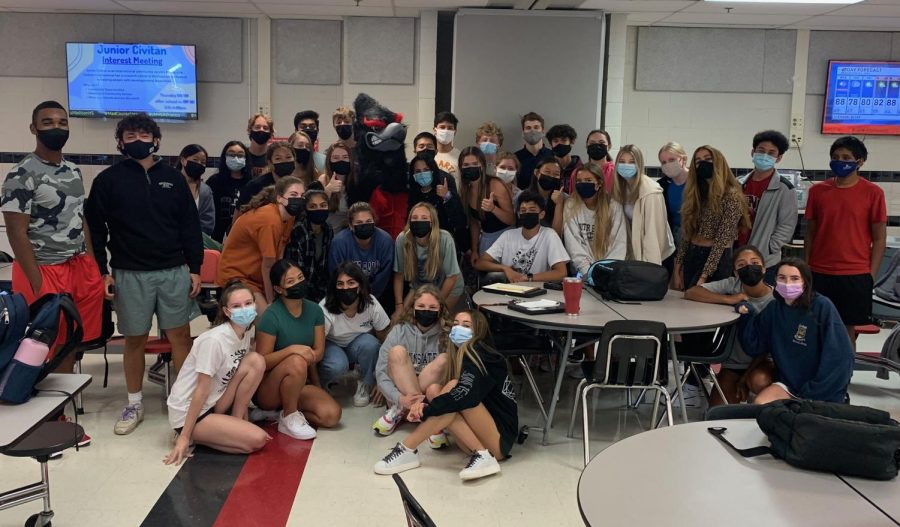SGA makes changes to promote equity at Madison
Madison’s SGA pictured in August 2021, prior to the 2021-2022 school year.
March 21, 2022
Over the past several years Madison’s Student Government Association (SGA) has initiated and encouraged a number of efforts to promote equity, inclusion and diversification within the Madison community.
For many years, Madison SGA functioned in a manner that sought only to follow long standing traditions and practices. Often, this approach to school structures and activities appeased the majority, who were looking for a “traditional” high school experience—looking to replicate the experiences portrayed in classic American media.
Unfortunately, this strategy has left minority populations underrepresented and underserved in public schools for decades. The efforts observed at Madison illustrate larger cultural shifts to promote equity and equality in public schools, which should be healthy and beneficial for all students.
Many of these changes have faced pushback from the majority. People will often undervalue the impact of seemingly small issues. People will claim that it’s “just high school” as an argument for preserving structures and practices that promote harmful stereotypes and create an environment where people of ethnic, sexual or gender-based minorities feel unsafe. Placation of the majority should not be placed over the safety and equality of the minority.
The 2019-2020 school year saw Madison’s first officially ungendered Homecoming court. For many years, LGBTQ+ students could not be represented in this classic high school tradition, but removing the restriction of one boy and one girl as the court for each grade changed this. The uplifting of one female and one male student as a symbolic queen and king—a symbolic “couple” to represent the grade—reinforced the supposed “correctness” of heteronormative relationships, causing LGBTQ+ students to feel isolated and excluded from the school community and its traditions.
The 2017-2018 school year saw Madison’s last “Mr. Madison” event. Mr. Madison was an end-of-year beauty pageant for male seniors. The event’s premise sexualized students and centered on heteronormative standards, jokes and expectations. This year, instead of Mr. Madison, SGA will be holding an event called “Madison Monarchs,” a similar concept open to all senior students regardless of gender identity. Madison Monarchs retains much of the positive spirit of the old tradition, creating a fun event for senior students in the final weeks of their high school career, without promoting the damaging aspects of the old event.
In addition to changes in the events they create, SGA has edited their election process to field a more accurate representation of the Madison student body in the SGA class. Old systems of promoting the elections and gaining members tended to gather a limited demographic of primarily white students. Most students who already felt marginalized would not feel comfortable running for an elected position or attempting to interview into SGA as a representative.
However, over the past several years the sponsors of the SGA class—Andrew Baird and Kirsten Stone—have reached out to the counseling department to seek recommendations of students who they think would be beneficial additions to the student government. This has allowed for better, more specified promotion of the interviewing process in SGA, which allows members to join without having to run an advertising campaign or deliver a speech to their grade. This has brought entirely new viewpoints to the student government from many different subcommunities at Madison.
This push for a diversification of the SGA class has been one of the most significant changes made by the SGA because, in what should be a form of representative democracy, the experiences of a broad selection of students is essential for determining what is best for the students.
These new viewpoints have added a great deal to the functioning of the Student Government. For the past two years there has been an “Equity and Inclusion” committee within SGA dedicated to promoting these ideals in both small, seemingly mundane areas and in larger-scale, school-wide (or even county-wide) areas. This committee has used the SGA social media presence to help educate the Madison student body, posting information on religious observance days, and pushing efforts like the Black history figures highlighted during Black History Month.
“I think the changes made in SGA are for the better,” said SGA member Nooshon Farhadi (‘23). “The group itself has diversified over the years and has brought attention to the different aspects of Madison’s student body.”
Many have criticized efforts like this for overdramatizing issues, but it is precisely this mindset that has allowed these problems to perpetuate, establishing damaging standards and viewpoints in and around the public school system.
Often the smallest change to promote representation for underrepresented populations can mean a world of difference in their perception of themselves, their culture and their identity.



